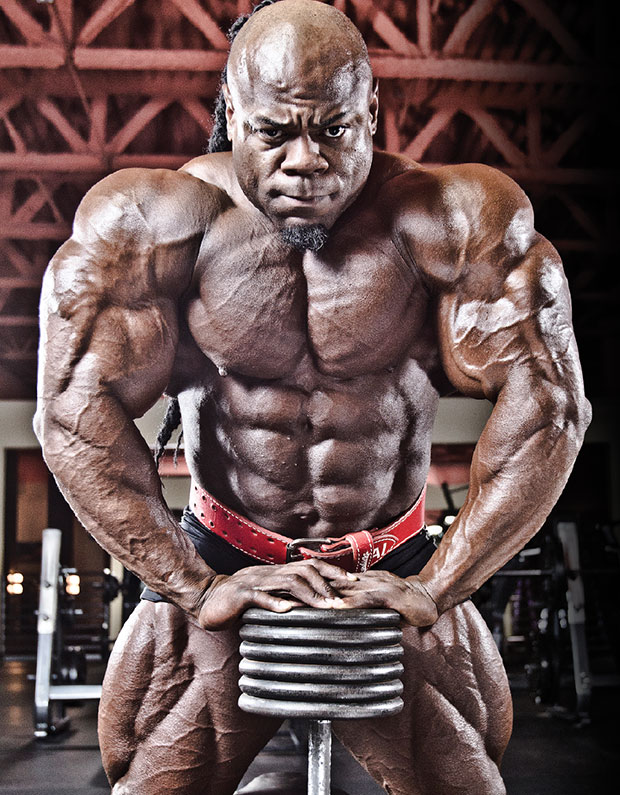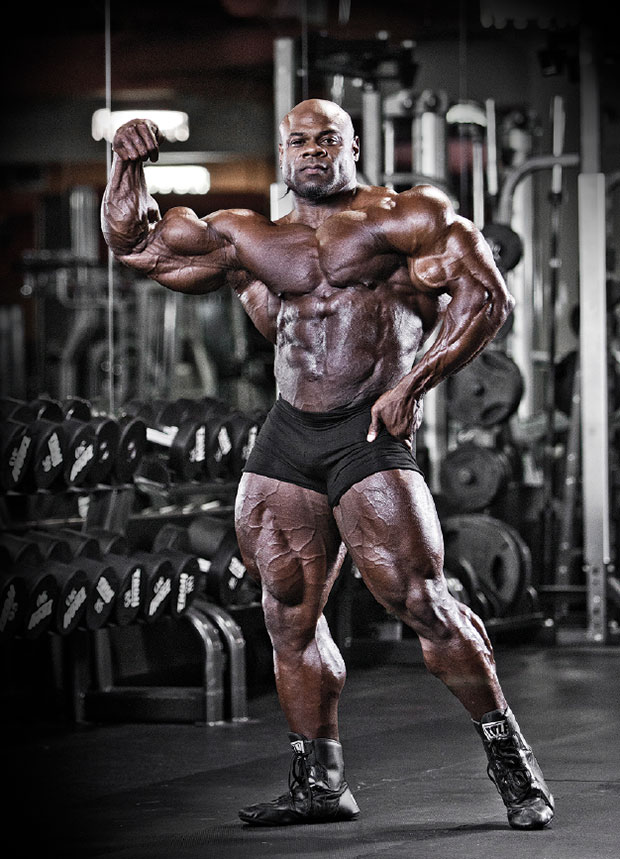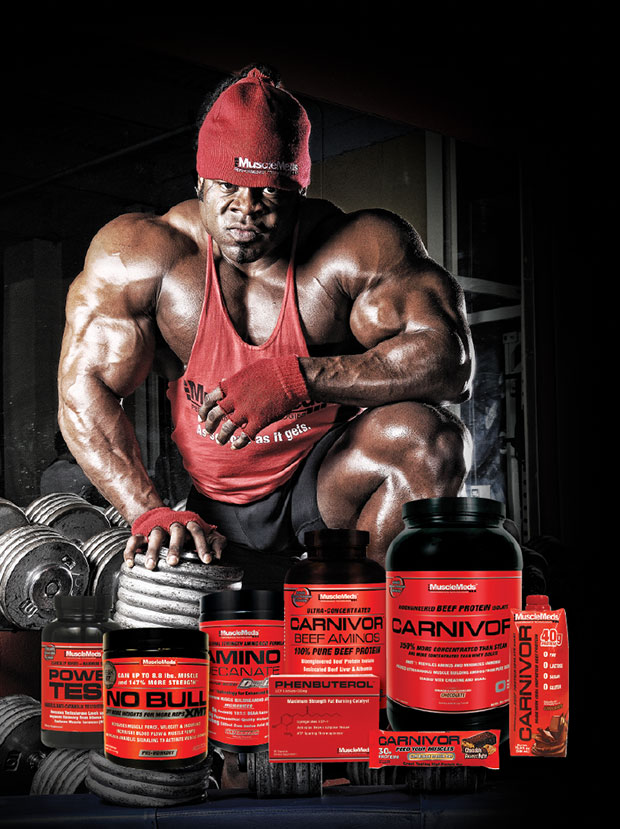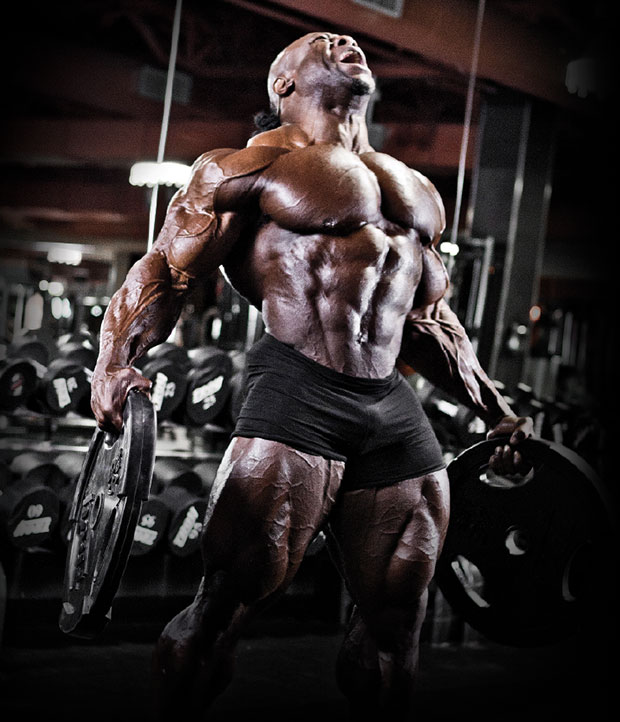Q and A with Kai Greene

FACE-TO-FACE WITH THE PREDATOR
Inside the Mind of Kai Greene
PHOTOGRAPHY BY JASON BREEZE
There is one man on the planet who—despite his tremendous popularity—is still a mystery to many bodybuilding fans. Sure, there are countless videos in which he speaks of his philosophy and articles where he covers his animalistic training routines. But if you had the chance for a face-to-face encounter, what questions would you ask Kai Greene? Fortunately, MuscleMeds had the opportunity to sit down with The Predator to gain insights into parts of his psyche and life, both in and out of the gym.
Personal questions:
1) How did you get into fitness and bodybuilding? And when?
As a young man of the age of 14, I first entered Fifth Avenue Gym in Brooklyn as a place to escape the outer elements of my life. The gym was that place where I saw and felt a sense of self-accomplishment. Stepping onstage for my first show a few years later, I knew this was what I was called to do. This was my place in life—and it has been ever since, every day, all day.
2) Who are your best friends and colleagues within the training and bodybuilding business? Do you work out with any of your competitors?
I’m good friends with Victor Martinez, whom I’ve competed against many times. We sometimes do promotional events together, and he’s a great bodybuilder and a stand-up guy with a good sense of humor.
3) How was it to star in Generation Iron?
Starring in the movie Generation Iron was a privilege and honour to be a part of a new era of history. It’s great to see the sport of bodybuilding going mainstream. It has also allowed the outside world to grab a glimpse of what our world is like. And with the DVD, there was a bonus feature mini-documentary called “The Making of Secret Sauce” included. It talks about my favourite MuscleMeds post-workout supplement that I’ve been using for three years, which was first seen by the public in the movie. The great news is that Secret Sauce now available to the public.

4) What are your interests besides bodybuilding? What do you do when you’re not working out?
During my time spent away from the gym, I find myself sketching, drawing, and painting. I’ve always taken an interest in creating my thoughts and visions and putting paint, pen, or pencil to paper. When I can’t seem to explain something, I can visually explain it through art.
5) What is your advice for young lifters who have just started training and want to grow even bigger and stronger?
My advice would be to set realistic goals that you can achieve on a short-term basis. These will lead to longer term goals. You can’t start out your fitness journey with the goal of benching 300 pounds or winning Mr. Olympia. You have to start with objectives that you can realistically reach on a daily, weekly, monthly, or yearly basis. Always stay mindful of the goals that you’re trying to achieve. Don’t let anyone discourage those goals. Surround yourself with those who encourage and push you into the path of your goals. Don’t rush the journey—it will come in time. Be sure to pursue your passion in the gym and always stay positive!
Questions related to training and diet:
1) How does your ordinary training day look? Do you train multiple times in one day? If yes, what do you train and how do you spread the different sessions over the course of the day?
A typical day in my training regimen starts off with morning cardio along with a combination of supersets of abdominal exercises and pull-ups. I always start each day with MuscleMeds supplements such as the new Power Test testosterone booster and Phenbuterol UPC-1 Activator fat burner to kick up my metabolism for cardio. I also take Carnivor Beef Aminos in the morning, and then drink an Amino Decanate shake before cardio.
Toward the afternoon I do my cardio regimen once again and hit abs a second time, and then I start my training regimen for the body part of that day. Before this workout, I take NO BULL XMT pre-workout formula. This gives me energy, focus, and a dose of Peak ATP that helps build muscle and strength. During the workout, I sip on another Amino Decanate shake that is also mixed with Creatine Decanate and Glutamine Decanate. This is the perfect intra-workout combination of aminos and creatine to fuel my muscles. Immediately following every weight-training workout, I take Secret Sauce to keep my body anabolic and help me recover faster. About 30 minutes after training, I drink one of the new Carnivor RTD shakes to get the 40 grams of beef protein I need to ensure complete recuperation, plus some more Beef Aminos. I spend anywhere from three to four hours per day at the gym.
2) Do you do any specific training to keep your agility and mobility? What we are referring to are any movements that help you better perform your acrobatic posing routines.
Yes, after my daily cardio regimen, I make sure to properly stretch. I also attend a movement class in upper Manhattan that plays a great role in my flexibility and body movement, especially with my posing. This is something I always work on. There is no such thing as being “muscle bound” if you invest a little time in flexibility training. And when you’re preparing for a powerful posing routine, you need to do more than just hit a bunch of poses in a row!

3) Do you get help to form your diet and training program? If yes, by who?
My diet is constructed through the guidance of my trainer, George Farah. My years of competing and finding what works and what doesn’t have helped George and me to collaborate and establish what will work the best. And that includes fortifying my diet with proper supplements to maximize my nutritional intake.
For my other supplements, I use Carnivor Mass all-beef weight gainer in the off-season to help me keep on maximum muscle without getting fat. I also use Hexaghen, which is a GH releaser, before bed each night with a Carnivor Beef Protein Isolate shake. And my favourite snacks are the soft-baked Carnivor Brownies and Bars. These taste amazing and give me either 15 or 30 grams (respectively) of protein per snack!
4) Where do you work out?
I generally train at Paerdegat Gym in Brooklyn, NY. I also sometimes go to Powerhouse Gym in Syosset, NY for training.
5) How does your diet look during an ordinary training day? How much energy (calories) do you consume on/off season? How does the nutrition look in terms of carbohydrates, fats and protein? How many meals do you eat on/off season?
I keep my meals consistent in the off-season as I would in season—anywhere from six to seven meals a day, consumed about every three hours. That way, I fuel my body with the nutrition I need to recover, build muscl, and maintain my metabolism. The basic overview is about 40 to 45 percent protein, 40 to 45 percent carbs and about 10 percent healthy fats.
6) How does your training change before a competition?
My training stays consistent all year round. However, as I get closer to a show, it begins to be more demanding, as the reps I perform tend to increase slightly. I find that my body responds well to high volume training and medium-to-heavy poundages for weight lifting, so I really don’t change routines from off-season to in season. It just doesn’t make sense to switch your workouts. I stay with the system that got me the gains in the first place.
7) How does your diet change before a competition?
Carbs tend to get utilized differently. By that, I mean the time of day I can eat carbs changes. For example, carbs would be better utilized during times of activity, such as morning cardio and before and after training. Protein intake does slightly increase as well—usually from 10 ounces of chicken and or steak to 6 ounces. I also switch up my protein to include Carnivor Mass in the off-season, for more clean calories and protein for anabolic muscle building. But in pre-contest mode, I stick more with regular Carnivor because there’s no carbs.

8) What motivates you to keep on training and competing?
My motivation comes in different terms—from my fans and friends who believe in me. And I believe in them. But above all, I can honestly say through it all that I genuinely love this sport of bodybuilding, and that is what keeps me motivated.
9) What is it that made the successful bodybuilder you are today?
The will to become better than the man I was yesterday. I had a vision greater than my dreams have envisioned. The moment I stepped on the Olympia stage, that vision had become a reality.
10) How strong are you (what are your stats in some of the most frequently used exercises)?
I never get caught up in how heavy I can lift or how strong I am compared to anyone else. I lift weights as a tool to build my muscles and shape my body as I want it to look to present onstage. That is the desired end result. The rest is just a process. So whether I squat 600 pounds or do lunges with 135 pounds, it’s the stimulation I feel from each and every rep that creates the musculature I need to win in my sport. The rest is just feeding an ego, which can get us into more trouble than it’s worth.
Additional questions:
1) How do you deal with a setback?
If you’re afraid of failure, then you’ll never grow. Applying this principle on a daily basis keeps me focused on positive goals. I am at this stage in my life and have an even greater dream. All that matters is that I keep believing and I never lose belief in that goal.

2) What is your favourite competition memory?
Each and every competition has its own unique memory. But one stands out the most—the Arnold 2011. I had gone through unimaginable struggles that many behind the curtains may know to this day. Then I won the Arnold Classic 2011. It was also the first time in my life I met Arnold Schwarzenegger. I shook his hand. I had my one minute of fame to give a message to my fans and friends, and I wanted that message to echo and touch many hearts. That message was to never give up, no matter how hard life throws you curveballs. If you want it bad enough, you’ll make your dreams a reality.
3) Which muscle is the most fun to train?
Legs. When it comes to training legs, there’s no greater feeling than struggling to walk the next few days—ha ha!
4) Which muscle is the most boring to train? Which of your muscle groups looks the best, according to you, and which one(s) do you need to increase in shape?
There’s no boring muscle group to train. Bodybuilding is a daily sanctuary where I get direct results from the efforts I impart. How could that be anything but phenomenal? If you look at your body as a whole, you know there are areas that naturally look bigger or more muscular, and others that require more work. But they all need work. Every day, I try to make improvements in the gym. Over time, it helps me concentrate on strengths and weaknesses so the package I present onstage is the best and most complete package possible.
5) Who’s your favourite bodybuilder of all time?
Wow—there are many great bodybuilders before me. Narrowing it down to one is simply unimaginable. But each and every one of my mentors have taught me to become the man I am today and educated me to train the way I train today. History can teach us a lot about the present time.
6) What are your predictions for Mr. Olympia 2015? Where do you see yourself the day you stop competing? Will you still be a part of the fitness industry or will you do something else completely?
I will be onstage at the 2015 Mr. Olympia. That’s my only goal at the present moment. Moving forward, I will always and forever be a part of the fitness industry. I see myself reaching out to the unknown world outside of bodybuilding and encouraging others through speech, through ambitions of the spotlight, and the artistic goals of my artwork.
For more on Kai Greene, including a gallery of images of his guest posing, click here!

